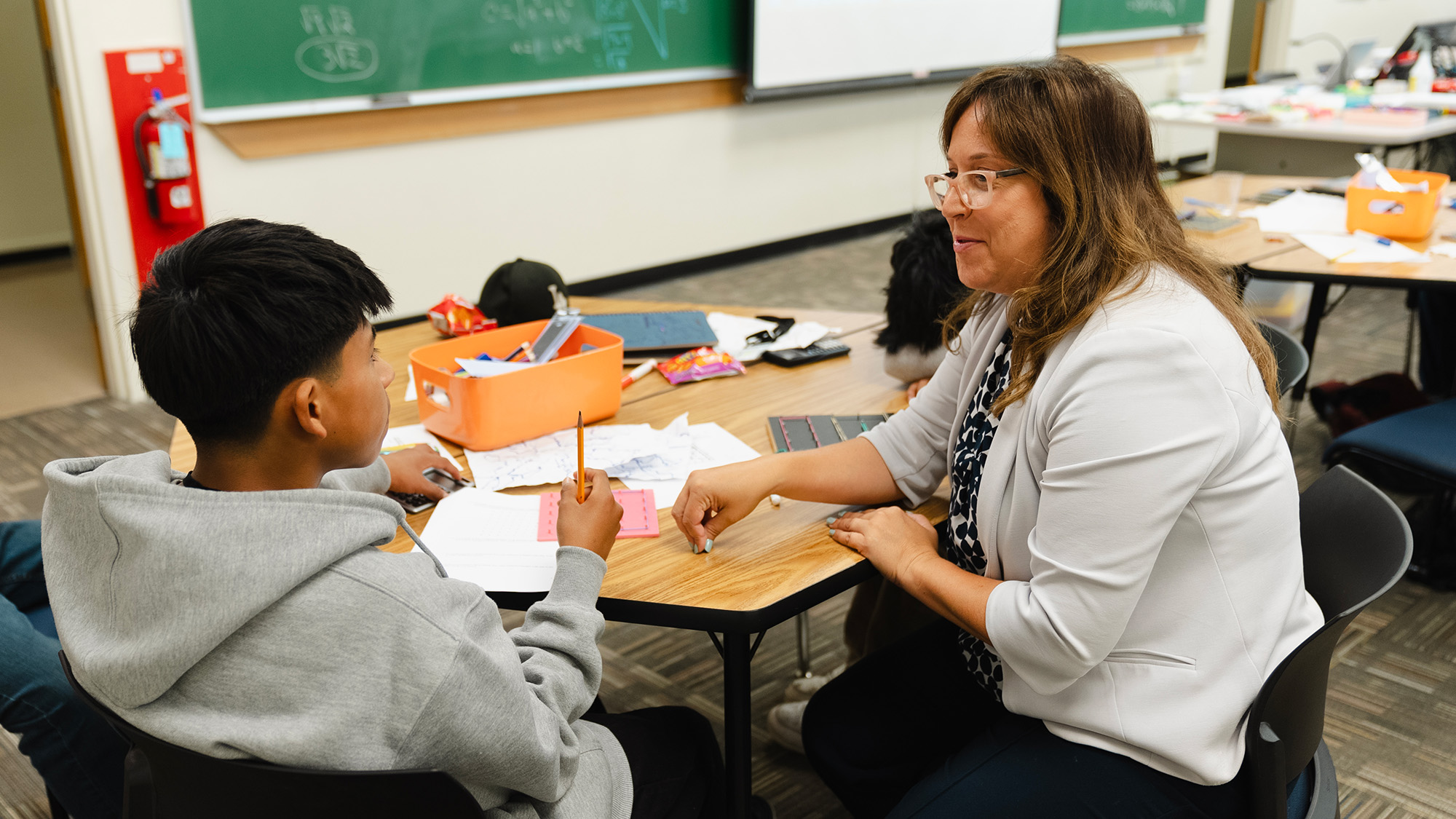Empowering Minds: Cal Poly Math Academy

By: Brian Fischer
The Cal Poly Math Academy is a collaboration between Extended, Professional and Continuing Education, the Cal Poly Math Department and the Migrant Education Program (MEP). The program bridges education gaps for the children of migratory workers in the agricultural, dairy, lumber and fishing industries, from San Miguel to Lompoc, ensuring they have equal opportunities to meet challenging academic standards. Each summer, Math Academy welcomes middle and high school students to campus for a week of hands-on, problem-solving-focused math.
The Math Academy supports a rich learning environment encouraging a successful transition to postsecondary education and employment opportunities in the future.
The Migrant Education Program plays a pivotal role in recruiting students for the Math Academy and providing daily transportation to and from the Cal Poly campus. This partnership is a natural alliance as both Cal Poly and MEP share a common goal of serving underrepresented students, making education accessible and enriching for all.
"I am proud to be a part of this program as I watch students transform from shy and unsure to confident and comfortable by the end of the week," says MEP Director Susanne Melton.
She feels the program is powerful for the students, considering the many challenges they face daily. "From substandard housing to food insecurity to parents who work incredibly long hours in unsafe conditions, our students carry a heavy burden. Their present and future are both cloudy, filled with uncertainty. So, to see them brought onto a beautiful campus, treated with dignity and respect, and given the opportunity to shine is incredibly moving."
The Math Academy schedule is designed to immerse students in a university environment while nurturing their mathematical skills. Students arrive in the morning, kickstarting the day with breakfast before delving into mathematics problems. Cal Poly students studying to become high school mathematics teachers lead problem-solving sessions, offering mentorship and guidance. Students receive lunch cards, providing them the opportunity to purchase meals on campus. This experience introduces them to university life. After lunch, the exploration continues with additional math problems and engaging activities or guest speakers. Activities are strategically chosen to fuel students' interest in STEM fields and provide insights into pathways to university entrance and careers.
Courses are taught by first-generation college students and Cal Poly professors Amelie Schinck-Mikel and Elsa Medina. The Math Academy tailors its curriculum to accommodate students from diverse mathematical backgrounds. The problems presented are carefully crafted to offer multiple access points, ensuring inclusivity for students at various levels; different solving methods, encouraging diverse approaches to problem solving; hands-on components, incorporating tangible elements for a practical understanding; collaboration and communication, fostering teamwork and effective communication; and deepening problem-solving skills, enabling students to enhance both critical thinking skills and applied knowledge.
For example, an experiential learning problem challenged students to create two different rectangular prisms by folding an 8.5 x 11-inch paper lengthwise and widthwise. The challenge extended to making educated guesses about which prism would have the greatest volume. Hands-on involvement included testing these guesses with popcorn and applying the volume formula for comparison. This practical task led to a meaningful conversation about volume and surface area, highlighting the value of Cal Poly's Learn by Doing approach to education.
The Math Academy's approach ensures that every student experiences success in problem-solving by fostering independent thinking, collaboration, and a deep understanding of mathematical concepts. The program is committed to making mathematics accessible and enjoyable, creating a pathway to future success for all participants. "It allows them to see a vision of their own future on a world-class university campus," says Melton. "Few of our students have ever had the opportunity to spend extended time on college campuses, and it is common for no one else in their family to have attained education beyond high school, so welcoming them into this space helps them imagine a different future."
"The best part of this academy was having fun while learning more about math," says a Math Academy student.
A former student said, "This academy wasn't what I expected, it was more. I loved it and never will forget it."
The Math Academy's inspirational teachers left a lasting impact, encouraging students to showcase their capabilities and achieve their goals. Guest speakers, including professors, inspire students to consider diverse career paths, such as health care or medicine, motivating them to pursue their aspirations. Melton sees the importance of these amazing Latinx role models. "One of the most powerful times of the week is when one of these role models tells their story, and the realization washes over the room, 'Hey, they're just like me!' It gives our students vital connections and a hope – 'One day, that could be me.'"
A former student agreed. "I got inspired from what the guest speaker said. That also motivated me to show my parents that I can accomplish what I set my mind to. I enjoyed listening to the speakers and what they had to say."
In essence, the Cal Poly Math Academy is not merely a summer program; it is a catalyst for change, breaking down financial barriers, addressing STEM disparities and instilling a love for learning that transcends the classroom. It is a testament to the power of education in transforming lives and shaping futures. Melton pointed out that students who participate in Math Academy tend to sign up for more of their programs during the regular school year. "It changes our students, giving them new connections and allowing them to dream big dreams for their future. We are deeply grateful for our partnership with Cal Poly that enables young migrant students to envision for themselves a brighter future."

 | EPaCE
| EPaCE